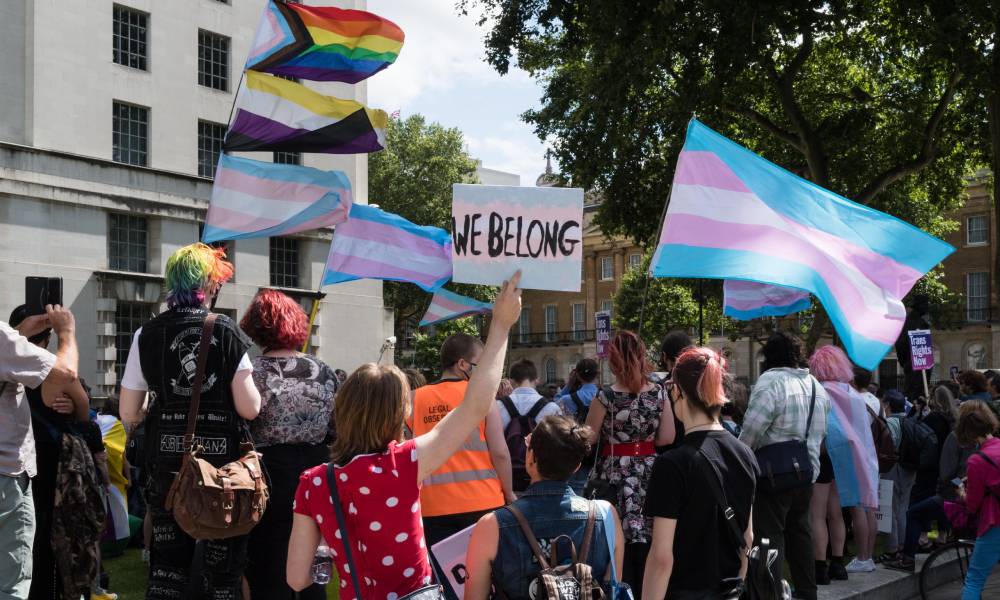Trans people and supporters protest outside Downing Street calling on the UK government to urgently reform the Gender Recognition Act on 6 August 2021. (Wiktor Szymanowicz/Barcroft Media via Getty)
University College London (UCL) has been criticised for disregarding the viewpoints of LGBT+ groups after it decided to cut ties with Stonewall.
UCL announced this week that it would end its involvement with the LGBT+ charity’s Diversity Champions programme, which advises on staff LGBT+ inclusion efforts. UCL also said it will not be making further submissions to Stonewall’s Workplace Equality Index, which rates employers on their LGBT-inclusive policies.
The university said the decision had been “informed by thoughtful and respectful debates” before the Equality, Diversity and Inclusion (EDI) committee and Academic Board. The EDI committee voted in favour of re-joining the Stonewall schemes while the academic board voted against UCL’s participation in either.
Ultimately, the UCL sided with the Academic Board, which cited concerns that membership in Stonewall’s programme could hinder “academic freedom and freedom of speech” around gender identity and sex.
The university stated: “In weighing up all opinions in this debate, UCL’s senior leadership team has accepted the Academic Board’s advice about the fundamental need to uphold academic freedom and freedom of speech in an academic context, recognising that a formal institutional commitment to Stonewall may have the effect of inhibiting academic work and discussion within UCL about sex and gender identity.”
UCL is the first university in the UK to formally cut ties with Stonewall, the Guardian reported.
LGBT+ groups involved in the debate on UCL’s relationship with Stonewall have lambasted the university’s decision not to re-join the schemes.
[email protected], the university’s staff and postgraduate student LGBT+ network, posted a statement from UCL’s LGBTQ Equality Steering Group (LESG) on social media.
In it, LESG said several queer groups and other organisations voted on UCL’s relationship with Stonewall. The group claimed: “All of these committees and groups voted to re-join both schemes, some with significant majorities.”
However, when it came to the final decision, LESG said these groups’ views and those of the “wider LGBTQI+ community at UCL” were “disregarded” by the university.
The group said: “During the Academic Board debate on Stonewall, despite a matter which directly relates to trans people’s experiences and rights at UCL being discussed in detail, there was absolutely no trans representation and no recognition was given that LGBTQI+ member of the academic board might have particular insights into the issues discussed.
“The views of trans people as expressed through LESG, [email protected] and other committees have been disregarded as have those of the wider LGBTQI+ community at UCL.”
Full statement from UCL’s LGBTQ Equality Steering Group in response to UCL’S withdrawal from the two Stonewall schemes: pic.twitter.com/X7JtZawdX5
— [email protected] (@UCLout) December 22, 2021
The LGBTQ Equality Steering Group thoroughly condemned the university for solely basing its decision on the vote by the academic vote. It argued the votes of the other groups are “surely of no lesser importance” than the academic board.
It added the groups had all “concluded that membership of Stonewall does not impact negatively on academic freedom”.
UCL’s LGBT+ Network also followed suit, harshly criticising the university for cutting ties with Stonewall.
“It comes as a huge blow to the entire community of LGBTQ+ students at UCL, who feel less safe and supported in the wake of this decision,” the group said. “Coming from an institution that proudly proclaims its commitment to promoting diversity, this decision clearly demonstrates to students that most of these claims remain empty promises.”
The UCL LGBT+ network added it was “deeply alarmed” by the “transphobic rhetoric used by the academic board’s decision to vote against rejoining the programme”, which it said “made its way into the university’s official communications of the decision”.
“The open and blatant transphobia expressed in the academic board meeting is shocking and disappointing,” the LGBT+ network declared.
The statement continued: “The fact that this content is allowed to go unchallenged within UCL’s administrative and academic spaces only points to how deep-seated the transphobic views are within the institution and how unwilling UCL is to properly address them.”
The group said the academic board’s argument that “aligning with Stonewall would stifle the ‘academic debates about sex and gender’” has been used by “advocates of so-called sex-based rights to invalidate trans identities and deny trans people their voice and their rights”.
“UCL’s opting out of Stonewall programme because of a few powerful voices propagating these ides long recognised as transphobic means that the institution is willing to let discriminatory views go unchallenged under the excuse of protecting academic freedom,” the UCL LGBT+ Network stated.
The university’s Student’s Union believed that UCL moving away from the Stonewall schemes has the “potential where gender prejudice and transphobic language is justified under the guise of academic freedom”.
The union said the university had “encouraged our community to learn to ‘disagree well’”. But it said it was concerned that “conflating freedom of speech with the right to use discriminative language sets a dangerous precedent”.
“It’s unacceptable to use the cover of academic freedom to exclude trans students and promote transphobia, and we’ll continue to call this out,” the student’s union said. “All trans people deserve to be treated with respect, dignity and humanity in our university – this is not an issue on which we can learn to disagree well.”
PinkNews contacted UCL for comment on the issues raised in this article.
